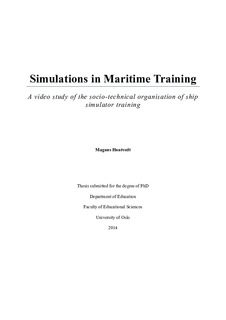| dc.contributor.author | Hontvedt, Magnus | |
| dc.date.accessioned | 2016-02-17T10:17:00Z | |
| dc.date.accessioned | 2017-10-03T13:26:41Z | |
| dc.date.available | 2016-02-17T10:17:00Z | |
| dc.date.available | 2017-10-03T13:26:41Z | |
| dc.date.issued | 2015 | |
| dc.identifier.uri | http://hdl.handle.net/11250/2458130 | |
| dc.description.abstract | This thesis is situated within the field of educational research, and examines the use of ship simulators to create work-like contexts in maritime training. Within the maritime domain the use of ship simulators is customary to connect theoretical and practical aspects of seamanship. In a broader educational context, this use of simulators can be considered a strategy to overcome the gap between school and work.
For investigating ship simulator training on an empirical level, training sessions were videotaped and scrutinised using interaction analysis. The thesis is founded on three studies conducted in a Norwegian educational facility between 2009 and 2014.
The thesis employs sociocultural and situated approaches to learning, which posit that opportunities for learning and instruction are founded in social interaction. The main findings show that simulators may be useful for situating learning in work-like contexts. Study I shows that role-playing can be an important resource for creating work-like contexts with distinct opportunities for learning and instruction. It is suggested that future practice should address this interactional level of training more effectively. Study II examines how maritime pilots enacted a simulated training environment and shows that full-mission simulations need to be closely linked to participants’ professional ways of solving work tasks—their professional vision. Study III outlines a framework for aligning learning objectives, simulator technology and learning outcomes in simulator training. This framework was developed to support trainers in their efforts to configure the socio-technical organisation of training.
Together, the three studies that form this thesis provide findings on the ways in which simulations can provide technological and social scaffolding for enacting work tasks in a safe and controlled setting. These findings contribute to earlier studies on simulation-based training as well as to studies of learning as a situated activity | nb_NO |
| dc.language.iso | eng | nb_NO |
| dc.relation.haspart | Study I: Hontvedt, M. & Arnseth, H.C. (2013). "On the bridge to learn: Analysing the social organization of nautical instruction in a ship simulator. International Journal of Computer-Supported Collaborative Learning, 8(1), 89–112. doi:10.1007/s11412-013-9166-3. Article omitted from online edition due to publisher restrictions | nb_NO |
| dc.relation.haspart | Study II: Hontvedt, M. (under revision). Professional vision in simulated environments: Examining maritime pilots’ performance of work tasks in a full mission ship simulator. Learning, Culture and Social Interaction. Article omitted from online edition. | nb_NO |
| dc.relation.haspart | Study III: Hontvedt, M. & Øvergård, K. (In review). Simulations at work: A framework for configuring simulator fidelity into training objectives. Education + Training. Article omitted from online edition. | nb_NO |
| dc.title | Simulations in Maritime Training: A video study of the socio-technical organisation of ship simulator training | nb_NO |
| dc.type | Doctoral thesis | nb_NO |
| dc.date.updated | 2016-02-17T10:17:00Z | |
| dc.description.version | submittedVersion | nb_NO |
| dc.rights.holder | Copyright The Author | nb_NO |
| dc.subject.nsi | VDP::Social science: 200::Education: 280::Subject didactics: 283 | nb_NO |
| dc.identifier.cristin | 1336794 | |
